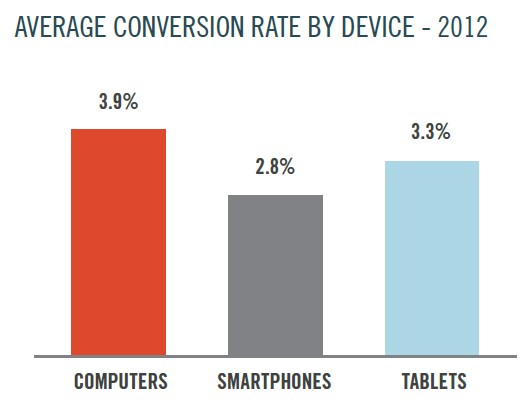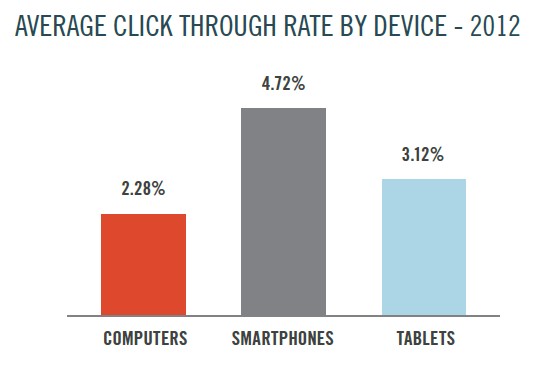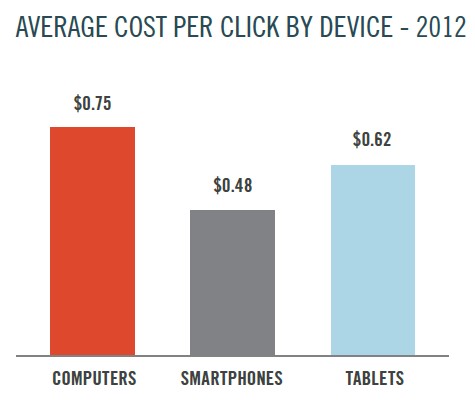Do Tablet Trends Support Google’s Shift To Combine Desktop & Tablet Targeting?
In the last three years, on the heels of Apple’s debut iPad in 2010, the rapid proliferation of tablet devices has changed the way consumers and advertisers interact across the paid search landscape. Consumers now rely on their tablets more than ever before to gain instant access to local business information, product details and reviews, […]
In the last three years, on the heels of Apple’s debut iPad in 2010, the rapid proliferation of tablet devices has changed the way consumers and advertisers interact across the paid search landscape.
Consumers now rely on their tablets more than ever before to gain instant access to local business information, product details and reviews, coupons, and competitors. The way tablets are used by consumers has resulted in a seismic shift in thinking from Google.

Image from Google Enhanced Campaigns microsite
In an effort to simplify the management of paid search campaigns while redefining the way search marketers think about and engage their audience, Google upgraded AdWords with enhanced campaigns in early February.
According to Google and its data, the line between desktops and tablets is blurring — search behavior and engagement on the two devices are aligning; and location, time of day, and the capabilities of these devices have become increasingly important signals in showing the right ads to users.
For search marketers, is acknowledging Google’s data and embracing enhanced campaigns the only thing left to do?
As previously covered by Greg Sterling, our mobile advertising supports Google’s claim that consumer behavior on tablets and desktops share increasing similarities. However, it also validates the understanding that desktops and tablets are inherently different and perform accordingly so.
Regardless, remaining successful in a multi-device world means accepting Google’s new combined targeting settings and understanding what it means for search marketers in the age of enhanced campaigns.
The Study & Its Findings
Over the last two years, tablets have proven to be a device segment that search marketers can’t ignore. In fact, the share of overall paid-search clicks served by Google on tablets increased from 6% to 10.7% in 2012; and by the end of 2013, we project that the share of tablet clicks will nearly double, accounting for 20% of Google’s US paid search ads clicks.
The reason is that consumers are increasingly turning to tablet devices to research and make purchases on-the-go, and, more importantly, in the comfort of their homes where desktop devices have traditionally reigned.
Conversion rates on search clicks originating from tablets increased by 31% in 2012, while smartphone and desktop conversion rates increased by 9% and 7%, respectively. By December 2013, we estimate that conversion rates for clicks originating from tablet ads will surpass those of desktop ads. Coupled with rising conversion rates, we also found that tablet ads are continuing to perform better than desktop ads.
Click-through rates (CTR) for search ads on tablets were 37% higher than ads delivered on desktops, with the average cost-per-click (CPC) on tablets 17% lower than on desktops. To capitalize on this opportunity, advertisers increased paid-search spend on tablets; and by the end of 2012, the share of spend on these devices had increased to 10%, eclipsing the share of spend on smartphones for the first time ever.
What Does This Mean?
Prior to enhanced campaigns, search marketers could’ve taken these tablet and desktop trends and optimized their programs accordingly — segmenting campaigns, reallocating budgets, and expanding keywords, all by device.
However, Google’s shift to combine desktop and tablet targeting has resulted in a significant loss of control and transparency that many sophisticated marketers crave for optimizing their programs.
Tablets will undoubtedly play a crucial role in the future of search, but whether the line between desktops and tablets will continue to converge and blur as Google has predicted, or intersect and separate over time, has yet to be seen.
All we know is that enhanced campaigns are here to stay, and desktop and tablet devices must now be treated as equals. But, we also know that the two devices are not the same, nor are their user experiences equal — desktops with their large screens, mouses, and primarily fixed locations versus tablets and their touchscreens, smaller search real-estate, and portability.
The mobile report certainly supports the current notion that different user experiences result in varying ad performance. Google’s gamble on the blurring of consumer behavior hinges on incomplete data about the future. As a result, we expect enhanced campaigns to evolve as market demand becomes evident.
Finding Success In The Future
With the migration to enhanced campaigns currently underway, search marketers must now prepare for a desktop-and-tablet-combined world. Gone are the days of separating campaigns to target these devices individually and provide a device-optimized user experience.
Search marketers must now optimize their campaigns and landing pages with the desktop and tablet user in-mind. Limiting the amount of Flash integrated into a website (iPads do not support Adobe Flash) or integrating finger-friendly buttons and links are two common strategies that marketers are implementing to address the paid-search challenges ahead.
Needless to say, enhanced campaigns have made today’s already highly-competitive search landscape even more treacherous. Marketers will need to continue investing in technology and new best practices to successfully drive media and acquire revenue in a redefined multi-device world.
Contributing authors are invited to create content for Search Engine Land and are chosen for their expertise and contribution to the search community. Our contributors work under the oversight of the editorial staff and contributions are checked for quality and relevance to our readers. The opinions they express are their own.
Related stories
New on Search Engine Land



